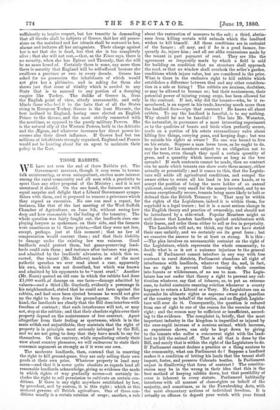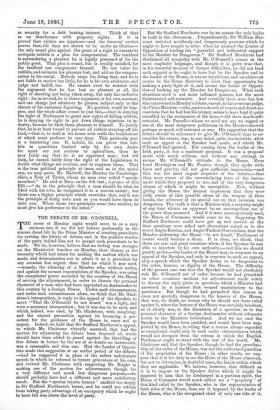THOSE RABBITS. AV E have not seen the end of these
Rabbits yet. The Government measure, though it may seem to towns- folk uninteresting, or even unimportant, excites more interest among the rural community and all men with a proclivity to sport than any other proposal of the Ministry ; and it is not unnatural it should. On the one hand, the farmers see with equal surprise and delight that a Liberal Government sympa- thises with them, and is prepared to remove a grievance which they regard as excessive. No one can read a report, for instance, like that of the last meeting of the West Suffolk Chamber of Agriculture, on June 9th, without seeing how deep and how reasonable is the feeling of the tenantry. The whole question was fairly fought out, the landlords even em- ploying lawyers as spokesmen on their side, and the farmers were unanimous as to three points,—that they were not free, except, perhaps, just at this moment ; that no law of compensation would content them ; and that their liability to damage under the existing law was ruinous. Good landlords could protect them, but game-preserving land- lords could ruin them ; and instance after instance was given, and admitted by the landlords' advocates, in which this oc- curred. One tenant (Mr. Mallows) made one of the most pathetic speeches we ever read about a ease, apparently his own, which was not described, but which was known and admitted by his opponents to be "most cruel." Another (Mr. Nunn) quoted an old case in which the rabbits had done £1,000 worth pf damage on one farm—damage admitted by valuers—and a third (Mr. Gayford), evidently a personage in his neighbourhood, stated that he could not farm against the rabbits, and had once been ejected because he would not give up the right to keep down the ground-game. On the other hand, the landlords see clearly that the Bill does interfere with freedom of contract ; that such interference will not, or may not, atop at the rabbits; and that their absolute rights over their property depend on the maintenance of free contract. Apart altogether from their feeling as sportsmen, which is in the main selfish and unjustifiable, they maintain that the right of property is in principle most seriously infringed by the Bill, and we are not going to deny that they have much to say for themselves. On the contrary, while repudiating utterly their view about country pleasures, we will endeavour to state their economic argument as strongly as if it were our own.
The moderate landlords, then, contend that in reserving the right to kill ground-game, they are only selling their own goods at their own price. Whatever property in land may mean—and that it is never quite absolute as regards land all reasonable landlords acknowledge, giving as evidence the mode in which rights of way gradually accrue—it certainly in- cludes the right to sell permission to cultivate on certain con- damns. If there is any right anywhere established by law, by precedent, and by custom, it is this right ; which at this moment governs all British agriculture. One of these con- ditions usually is a certain rotation of crops ; another, a rule about the restoration of manures to the soil ; a third, abstin- ence from killing certain wild animals which the landlord wishes to kill himself. All these conditions are in restraint of the farmer ; . all may, and if he is a good farmer, fre- quently do, injure him ; and all are alike concessions made by the tenant in part payment of rent. They are like the agreement so frequently made by which a field is sold for building on condition that no structure shall approach the road, or that no window shall overlook the seller's garden, . conditions which injure value, but are considered in the price. What is there in the exclusive right to kill rabbits which establishes a difference between that and any other considera- tion in a sale or hiring ? The rabbits are noxious, doubtless, or may be allowed to become so; but their noxiousness, their potential power of injuring young crops, has been allowed for in the contract. If not, why did the tenant—who, be it re- membered, is an expert in his trade, knowing much more than the landlord does—sign that contract ? He knows all about rabbits. To say the landlord is fanciful, is to say nothing. Why should he not be fanciful ? The late Mr. Waterton, the naturalist, in pursuance of a most interesting experiment as to the qualities of beasts and birds when perfectly secure, made on a portion of his estate extraordinary rules about killing live things, carrying guns, and keeping dogs ; but was he outside his rights as owner ? No one was bound to live on his estate. Suppose a man loves trees, as he ought to do, may he not let his meadows subject to an obligation not to cut the trees, even though they spoil a certain quantity of grass, and a quantity which increases as long as the tree spreads ? If such contracts cannot be made, then no contract can be made which tenants can show costs them money, either actually or potentially ; and it comes to this, that the Legisla- ture will settle all agricultural conditions, and compel the owner either to retain all his land in his own hands, or to accept the position of being the mere holder of an annual quit-rent, usually very small for the money invested, and by no means exceptionally secure, tenants being more likely to bolt or defraud than the British Treasury is. That may be within the rights of the Legislature, indeed it is within them, for copyhold is a legal tenure ; but it is a most serious change in the English theory and practice of ownership, and should not be introduced by a side-wind. Popular Members might as well decree that London landlords spoiled architecture with their leases, and order them either to sell or feu in perpetuity.
The Landlords will not, we think, say that we have stated their case unfairly, and we certainly see its great force ; but we conceive the answer to be at least as strong. It is this : —The plea involves an unreasonable restraint on the right of the Legislature, which represents the whole community, to decide what is or is not a nuisance injurious to the general weal. If Parliament cannot interfere in any way with free contract in rural districts Parliament abandons all right of interference with landlords, whatever they do, and, in fact, has no right to prevent their turning whole counties into forests or wildernesses, of no use to man. The Legis- lature has not under that theory a right to prevent any cul- tivation whatever, say that of tobacco, or, to put an extreme case, to forbid contracts ensuring eviction whenever a county happens to return a Liberal or a Tory. No Legislature can so surrender its ultimate rights as supreme owner and guardian of the country on behalf of the nation, and no English Legisla- ture will ever do it. Consequently, the question is reduced from one of right to one of the reason for the exercise of that right ; and the reason may be sufficient or insufficient, accord- ing to the evidence. The complaint is, briefly, that the most important industry in the kingdom is imperilled or injured by the over-rapid increase of a noxious animal, which increase, as experience shows, can only be kept down by giving to the tenants who suffer a concurrent right with the land- lord to kill the animal off. That is all that is done by the Bill, and surely that is within the right of the Legislature to do. If Parliament cannot declare a practice or a thing noxious to the community, what can Parliament do ? Suppose a landlord makes it a condition of letting his lands that the tenant shall import, foster, and preserve Colorado beetles. Is Parliament unjust in disallowing that form of contract? The constitu- encies may be in the wrong in their idea that this is the best method of keeping rabbits down, but that possibility of error is inherent in every statute. Parliament habitually interferes with all manner of class-rights on behalf of the majority, and sometimes, as in the Pawnbroking Acts, with the most elementary notions of individual freedom. It is actually an offence to deposit your watch with your friend as security for a debt bearing interest. Think of that as an interference with property rights. If it is proved that rabbits are injurious—and the farmers' verdict proves that, till they are shown to be under an illusion— the only sound plea against the grant of a right to tenants to extirpate rabbits is a plea for compensation. The landlord is surrendering a pleasure he is legally possessed of for the public good. That plea is sound, but is readily satisfied, for the landlord can compensate himself. He can value his rabbits, and estimate his pleasure lost, and add on the compen- sation to his rental. Nobody stops his doing that, and he is not liable to receive too little, for he is his own arbitrator, and judge and bailiff, too. He cannot even be worried with the argument that he has lost no pleasure at all, his right of shooting not being taken away, but only his exclusive right ; for as we said, he is above argument, is his own assessor, and can charge just whatever he pleases, subject only to the chance of his customer departing. No position could be hap- pier, and the whole affair comes to just this,—that in denying the right of Parliament to grant new rights of killing rabbits, he is denying its right to put down things injurious to in- dustry, because he finds them pleasant to himself. To justify that, he is at least bound to prevent all rabbits straying off his land,—that is, to wall in his farms with walls the foundations of which must perforce be very deep. This particular pest is a burrowing one. If, indeed, he can prove that rab- bits in quantities limited only by his own desire for sport are not noxious to agriculture, then he may fairly say that he is an oppressed man ; but till then, he cannot fairly deny the right of the Legislature to decide what things are noxious, and to suppress them. That is the true political principle at issue, and as to the moral one, we may quote Mr. Rodwell, the Member for Cambridge- shire, a Tory of Tories, whom no man ever called "mealy- mouthed." He said at Bury, on the 9th inst., d propos of this Bill :—" As to the principle that a man should do what he liked with his own, be recognised it to a certain extent ; but there was a higher principle which overrides that, and it was the principle of doing unto men as you would have them do unto you. When these two principles came into conflict, he must give his preference to the latter."



































 Previous page
Previous page